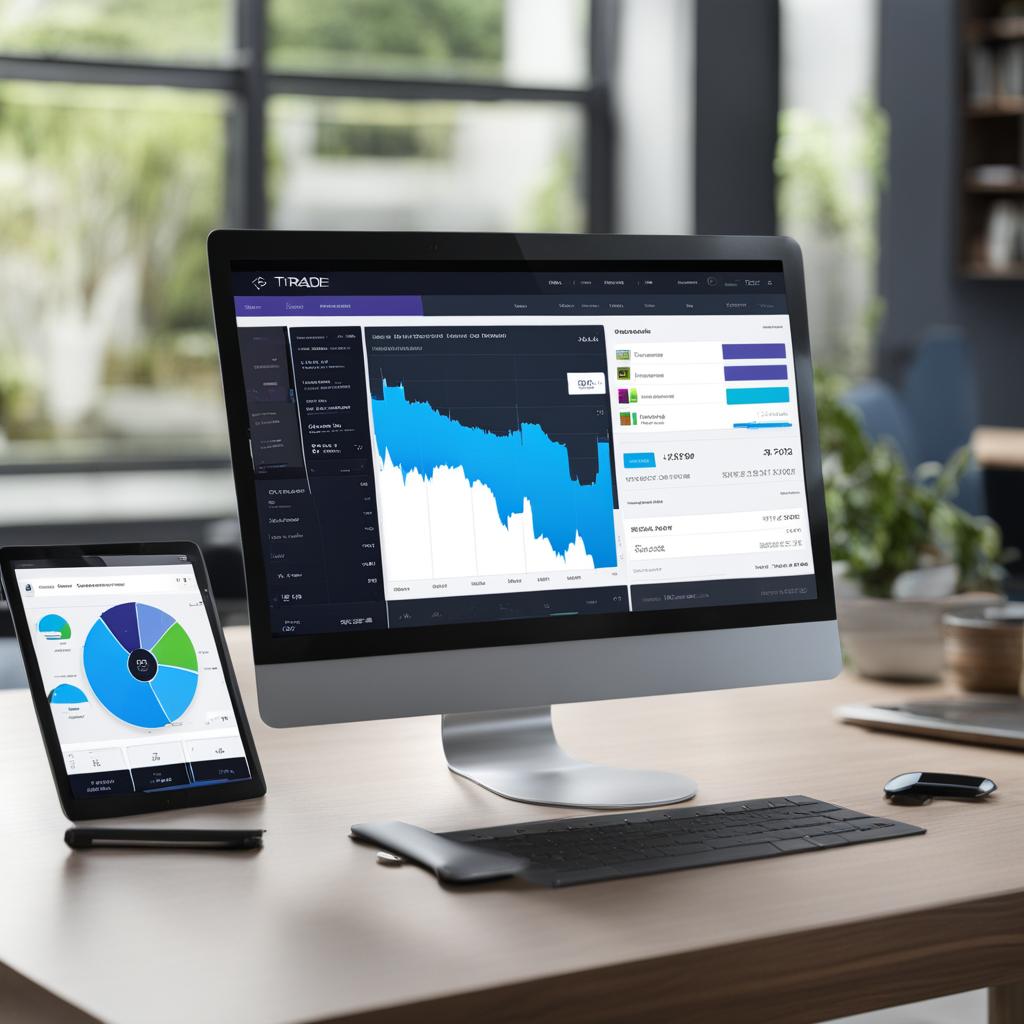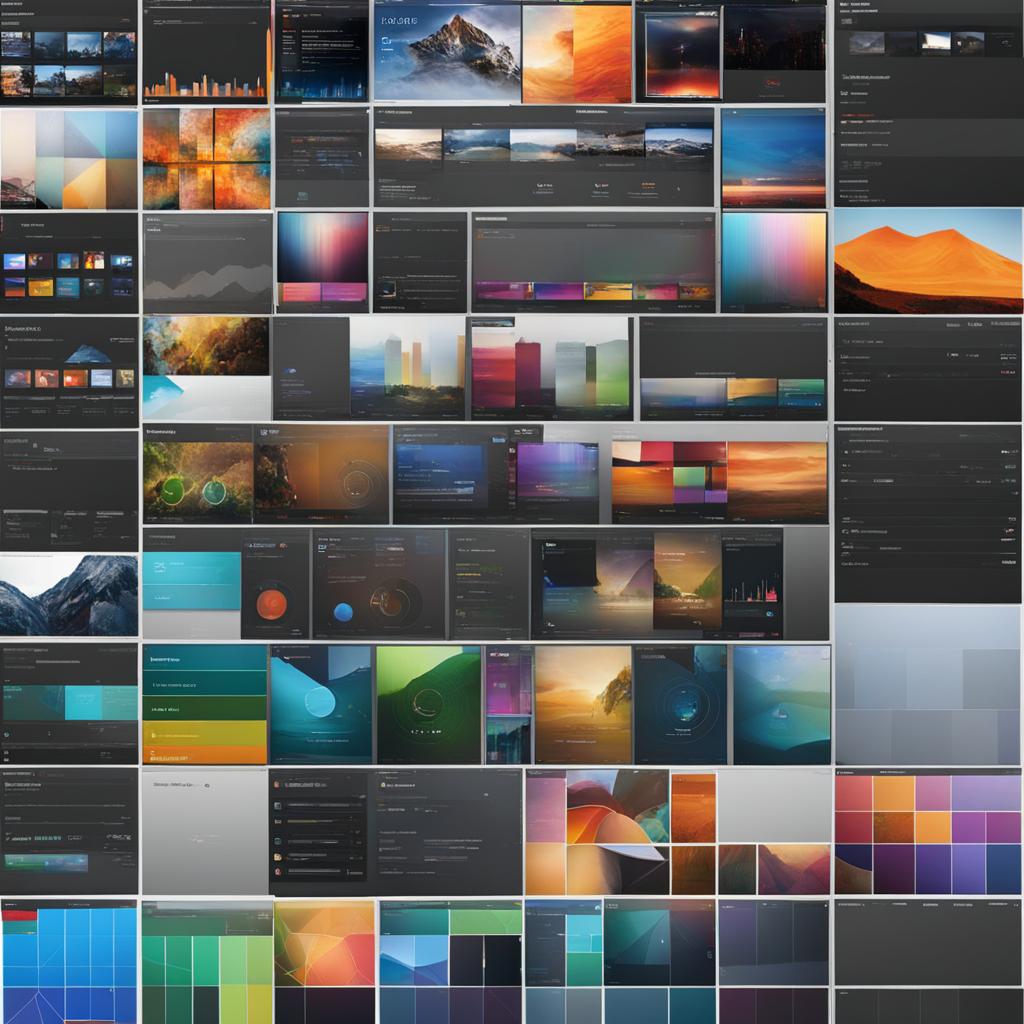When it comes to day trading, having the right online platform is essential for success. With so many options available, choosing the best trading platform can be a daunting task. That’s why I’ve done the research and compiled a list of the top online trading platforms in 2024. Whether you’re a beginner or an experienced trader, these platforms offer the features and tools you need to make informed decisions and maximize your profits.
Key Takeaways:
- Fidelity is the best overall trading platform, offering a wide range of investment choices and low fees.
- Betterment is perfect for hands-off investors, with automated investing and tax-saving tools.
- TD Ameritrade stands out for its extensive educational resources and advanced analytical tools.
- E*Trade is an ideal choice for beginners, providing user-friendly platforms and access to educational materials.
- Charles Schwab is known for its low-cost ETF trades and a wide range of investment options.
What is Day Trading and Pattern Day Trading?
When it comes to active trading, two terms that often come up are day trading and pattern day trading. Let’s dive into what these terms mean and the regulations surrounding them.
Day trading is a trading strategy that involves buying and selling or short-selling and buying the same security on the same day. Day traders aim to take advantage of short-term price movements and capitalize on intraday volatility. This fast-paced trading style requires quick decision-making and the ability to execute trades efficiently.
Pattern day trading refers to traders who engage in four or more day trades within a five-business-day period, with those day trades representing more than 6% of their total trading activity. The Securities and Exchange Commission (SEC) has implemented regulations to oversee pattern day traders to protect against excessive risk-taking. One of these regulations is the requirement for pattern day traders to maintain a minimum equity of $25,000 in their trading accounts.
To clarify, not all day traders are considered pattern day traders. Only those who meet the criteria mentioned above are subject to the SEC regulations. It’s important to note that the $25,000 minimum equity requirement applies to day traders using margin accounts for their trading activities.
While day trading can be an exciting and potentially profitable endeavor, it’s essential to understand and comply with the SEC regulations if you qualify as a pattern day trader. These regulations are in place to protect both traders and the overall market.
Keep in mind that regulations can change over time, and it’s essential to stay informed about the latest SEC guidelines and regulations related to day trading and pattern day trading.
The Importance of a Reliable Trading Platform
As a trader, choosing a reliable trading platform is paramount to your success. The platform you use can have a significant impact on your trading experience and ultimately your profitability.
A reliable trading platform offers a multitude of benefits that can give you a competitive edge in the market. Firstly, it allows you to execute trades quickly and efficiently. With fast order execution, you can take advantage of profitable trading opportunities and stay ahead of market movements.
Additionally, a reliable platform provides access to real-time data and market information. This real-time data is crucial for making informed trading decisions and staying updated on market trends. It helps you identify profitable trading opportunities and react promptly.
Furthermore, a good trading platform offers a range of advanced tools that can enhance your trading strategies. These tools could include technical analysis indicators, customizable charts, and risk management features. With such tools at your disposal, you can analyze market conditions, identify patterns, and optimize your trades for better profits.
Ultimately, the importance of a reliable trading platform cannot be overstated. It serves as the foundation for your trading activities, enabling you to execute trades efficiently, access real-time data, and utilize advanced tools. By choosing a reliable trading platform, you can increase your chances of success and achieve your trading goals.
Next, let’s take a closer look at Fidelity, one of the best trading platforms for investors across the globe.
Fidelity: Best Overall Trading Platform
Fidelity – Best Overall Trading Platform
Fidelity is widely recognized as the best overall trading platform, offering a comprehensive range of features and benefits that cater to the diverse needs of traders. Whether you are a beginner or an experienced investor, Fidelity provides the tools and resources to help you make informed investment decisions.
One of the key advantages of Fidelity is its extensive investment choices. Traders have access to a wide variety of stocks, options, ETFs, and mutual funds, allowing for diversification and flexibility in building an investment portfolio. Additionally, Fidelity offers access to international investments, providing opportunities to explore global markets and expand investment horizons.
Another noteworthy feature of Fidelity is its low fees. The platform offers commission-free trades for stocks, options, ETFs, and mutual funds, enabling traders to save on transaction costs and maximize their returns. This fee structure makes Fidelity a cost-effective choice for investors, especially those who frequently trade or have a higher trading volume.
Furthermore, Fidelity is committed to empowering traders through its extensive educational resources. The platform provides a wealth of educational materials, including articles, videos, webinars, and online courses that cover a wide range of investment topics. Whether you are a beginner looking to learn the basics or an experienced trader seeking advanced strategies, Fidelity has the resources to support your learning and growth.
To summarize, Fidelity stands out as the best overall trading platform due to its wide range of investment choices, low fees, and extensive educational resources. With Fidelity, traders can access a diverse range of investment options, benefit from cost-effective trading, and enhance their investment knowledge through educational materials.
| Advantages of Fidelity |
|---|
| Wide range of investment choices |
| Low fees for commission-free trades |
| Extensive educational resources |
Betterment – Best for Hands-Off Investors
When it comes to automated investing, Betterment is the go-to choice for hands-off investors. With its innovative features and commitment to helping individuals achieve their financial goals, Betterment stands out as one of the best trading platforms in the market.
Betterment offers a range of advantages that make it the ideal platform for those who prefer a hands-off approach to investing. First and foremost, it has no minimum balance requirements, allowing investors of all levels to get started without hesitation. Whether you’re a beginner or an experienced investor, Betterment welcomes you with open arms.
Furthermore, Betterment provides tax-saving tools that can significantly benefit your investment strategy. It employs an upfront tax-smart investing strategy, utilizing sophisticated algorithms to minimize tax liability. By optimizing your portfolio for tax efficiency, Betterment ensures that you keep more of your returns in your pocket.
Another notable feature of Betterment is its automatic portfolio rebalancing. This feature ensures that your investment portfolio remains aligned with your desired asset allocation. As the market fluctuates, Betterment automatically rebalances your portfolio to maintain the desired risk and return levels. This hands-off approach removes the need for constant monitoring and adjustments, giving you peace of mind while your investments grow.
If you ever need professional guidance, Betterment offers the option to work with qualified financial advisors. These advisors can help you create a personalized investment plan and provide expert insights tailored to your unique needs and financial goals. The combination of automated investing and access to human advisors offers a comprehensive and holistic investment experience.
Take a look at the table below for a summary of Betterment’s key features:
| Key Features of Betterment | Description |
|---|---|
| No minimum balance requirements | Start investing with any amount you’re comfortable with. |
| Tax-saving tools | Utilize an upfront tax-smart investing strategy to maximize your returns. |
| Automatic portfolio rebalancing | Maintain the desired asset allocation without manual intervention. |
| Access to qualified financial advisors | Get expert guidance and personalized investment plans when needed. |
The Betterment Experience
With Betterment, you can embark on your investment journey with confidence. The platform’s user-friendly interface and seamless automation make it easy to get started and stay on track. Whether you’re saving for retirement, a down payment on a house, or simply building wealth for the future, Betterment has the tools and features to help you achieve your financial goals.
Why settle for less when Betterment offers the best for hands-off investors?
TD Ameritrade – Best for Educational Resources
When it comes to educational resources, TD Ameritrade is a standout among trading platforms. The platform provides a wealth of resources to help traders enhance their knowledge and skills.
One of the key features of TD Ameritrade is its extensive web platforms and mobile apps that offer a wide range of educational materials. Traders can access comprehensive educational resources such as articles, videos, tutorials, and webinars to deepen their understanding of investing basics and advanced strategies.
TD Ameritrade’s commitment to education is further emphasized through its thinkorswim platform. This powerful tool allows traders to simulate trades and practice their strategies without risking real money. Additionally, the platform provides advanced charting capabilities, enabling traders to analyze market trends and make informed decisions.
Another advantage of TD Ameritrade is its $0 commission for stock, ETF, and options trades. This pricing structure allows traders to focus on their education and trading strategies without incurring high fees.
Whether you are a beginner looking to learn the ropes or an experienced trader seeking to expand your knowledge, TD Ameritrade’s educational resources are designed to empower and educate traders at all levels. So, if you value educational support in your trading journey, TD Ameritrade is the platform for you.
Key Features of TD Ameritrade:
- Extensive web platforms and mobile apps
- Comprehensive educational materials, including articles, videos, tutorials, and webinars
- Simulated trading through the thinkorswim platform
- Advanced charting capabilities
- $0 commission for stock, ETF, and options trades
TD Ameritrade’s dedication to providing high-quality educational resources makes it a top choice for traders who prioritize learning and improving their trading skills.
E*Trade – Best for Beginners
As a beginner in the world of trading, it can be overwhelming to choose the right platform to kickstart your investment journey. But fear not, because E*Trade is here to help you get started with ease.
E*Trade is renowned for its user-friendly platforms that cater specifically to beginners. With intuitive interfaces and easy-to-navigate features, you’ll feel confident and empowered as you take your first steps into the trading world.
One of the greatest advantages of choosing E*Trade as a beginner is the absence of commission fees on trades for stocks, options, ETFs, and mutual funds. This allows you to learn the ropes and explore different investment opportunities without worrying about extra costs eating into your profits.
To further support your learning journey, E*Trade provides access to a wide range of educational materials and research tools. These resources are designed to equip you with the knowledge and insights needed to make informed investment decisions.
For the busy beginner on the go, E*Trade offers advanced mobile apps that allow you to trade conveniently from your smartphone or tablet. This ensures that you can stay connected to the market and manage your investments anytime, anywhere.
Additionally, E*Trade’s customized stock screening feature enables you to filter and search for stocks based on your preferences and investment criteria. This saves you time and effort by narrowing down the vast options available and identifying potential opportunities that align with your goals.
So whether you’re a novice trader or just starting to explore the world of investing, E*Trade is the perfect platform to begin your journey. With its beginner-friendly features, commission-free trades, educational resources, and advanced mobile apps, E*Trade sets you up for success right from the start.

Charles Schwab – Best for ETFs Trades
When it comes to trading in ETFs, Charles Schwab stands out as the top choice for investors. With its vast selection of ETFs and low fees, Charles Schwab offers an excellent platform for ETF trading. Whether you’re a seasoned investor or just starting out, Charles Schwab provides a range of investment options to suit your needs.
One of the key advantages of Charles Schwab is its commission-free ETF trades. This means you can buy and sell ETFs without incurring any additional fees. This can significantly reduce your trading costs and enhance your overall investment returns. With a wide selection of ETFs available, you can choose from various asset classes, sectors, and investment strategies.
Not only does Charles Schwab excel in ETF trading, but it also offers a diverse range of investment options. From individual stocks to bonds, mutual funds, and more, you can build a well-rounded portfolio that aligns with your investment goals. Whether you’re looking for growth opportunities or stable income, Charles Schwab has you covered.
“Charles Schwab’s focus on ETF trading and its vast selection of ETFs make it an ideal choice for investors seeking diversification and low fees.”
Key Features of Charles Schwab:
- Commission-free ETF trades
- Wide selection of ETFs across various asset classes
- Options for individual stocks, bonds, mutual funds, and more
- Low fees and competitive pricing
- User-friendly trading platform
- Access to research tools and educational resources
With its reputation as a reputable brokerage firm and its strong focus on ETF trading, Charles Schwab is undoubtedly one of the best platforms for investors looking to trade ETFs. Take advantage of the commission-free trades, diverse investment options, and user-friendly interface to make the most of your ETF trading experience.
Webull – Best Investment App
When it comes to finding the best investment app, Webull is a top contender. With its user-friendly interface, commission-free trades, and extensive range of investment choices, Webull offers a seamless trading experience for both experienced investors and beginners alike.
One of the standout features of Webull is its real-time market data, providing users with up-to-the-minute information on stocks, options, and other investment opportunities. This allows traders to make informed decisions and stay ahead of market trends.
Webull also offers advanced tools for technical analysis, empowering users to perform in-depth research and make strategic investment moves. With customizable charts and indicators, investors can identify patterns and trends to further optimize their trading strategies.
“Webull provides a comprehensive suite of tools and features that cater to the needs of investors at all levels. Whether you’re a seasoned trader or just starting out, Webull offers the resources and support to help you succeed in the stock market.”
Webull’s commitment to user experience is evident in its intuitive design and easy navigation. The app is thoughtfully designed to ensure that traders can quickly access the information they need and execute trades seamlessly.
With its commission-free trades, Webull eliminates trading fees, allowing users to maximize their investment returns. This cost-effective approach makes it an attractive choice for investors looking to keep expenses low.
Overall, Webull stands out as the best investment app due to its user-friendly interface, commission-free trades, real-time market data, and advanced tools for technical analysis. Whether you’re a seasoned investor or just starting out, Webull offers a reliable and feature-rich platform to support your investment journey.

Vanguard – Best for Low-Cost Funds
When it comes to investing in low-cost funds and adopting a long-term investment strategy, Vanguard stands out as a top choice. With a wide range of index funds, ETFs, and mutual funds, Vanguard offers investors a diverse selection of investment options with competitive expense ratios.
One of the key advantages of choosing Vanguard is its focus on low fees. The company pioneered the concept of index funds and has remained committed to providing cost-conscious investors with affordable investment solutions. By adopting a passive investing approach, Vanguard aims to match the performance of the overall market, allowing investors to benefit from long-term investment growth.
For those looking to build a diversified portfolio, Vanguard offers a variety of investment options across different asset classes and sectors. Whether it’s domestic or international equities, fixed income securities, or specialty funds, Vanguard has an extensive lineup to meet diverse investment preferences and goals.
Key Features of Vanguard:
- Wide range of index funds, ETFs, and mutual funds
- Competitive expense ratios
- Focused on low-cost, passive investing
- Diverse investment options for building a well-rounded portfolio
- Long-term investment strategy
By prioritizing low-cost funds and emphasizing long-term investment strategies, Vanguard has earned a reputation as a reliable and trusted investment provider. Whether you’re a seasoned investor or just starting out, Vanguard’s commitment to low fees and long-term growth makes it an ideal choice for cost-conscious investors.
| Fund Type | Expense Ratio (%) | Minimum Investment |
|---|---|---|
| Index Funds | 0.04% – 0.20% | $3,000 – $100,000 |
| ETFs | 0.03% – 0.23% | Varies |
| Mutual Funds | 0.17% – 0.20% | $1,000 – $5,000 |
Robinhood – Best for Commission-Free Trading
When it comes to commission-free trading, Robinhood stands out as one of the top choices for traders. With its user-friendly platform and zero fees, it has gained popularity among investors of all levels.
Robinhood allows users to buy and sell stocks, options, and cryptocurrencies without any commission charges. This means that traders can execute their trades without worrying about incurring additional costs.
One of the key advantages of Robinhood is its simplicity. The platform is easy to navigate, making it accessible to both beginners and experienced traders. It provides a streamlined trading experience, allowing users to focus on their investment decisions.
Additionally, Robinhood offers real-time market data and customizable watchlists, enabling traders to stay informed about market trends and make informed trading decisions. This access to up-to-date information is crucial for achieving success in the ever-changing financial markets.
Robinhood’s commitment to democratizing finance has made it a popular choice for those looking to minimize trading costs while having access to a wide range of investment options. Its user-friendly interface and commission-free trades make it an attractive platform for traders of all backgrounds.
| Pros of Robinhood | Cons of Robinhood |
|---|---|
|
|
To sum it up, Robinhood is an excellent choice for traders who prioritize commission-free trading and a user-friendly platform. Its simplicity, accessibility, and zero fees make it a compelling option for those looking to minimize trading costs while exploring the world of stocks, options, and cryptocurrencies.

Comparison of Trading Fees and Account Minimums
When choosing a trading platform, it is crucial to consider the associated trading fees and account minimums. Each platform has its own fee structure and requirements, which can greatly impact your trading experience and profitability. To make an informed decision, it is essential to compare trading fees, account minimums, and other costs before selecting a platform.
Some platforms may offer commission-free trades for certain securities, such as stocks and ETFs. However, it is important to dig deeper and examine other potential fees that may apply. Inactivity fees, for example, can be charged if you don’t meet specific trading requirements or fail to maintain a certain level of activity in your account. Additionally, some platforms may charge high margin rates for borrowing funds to trade on margin.
Account minimums are another important factor to consider. These requirements vary among trading platforms and can range from no minimum balance to thousands of dollars. Before opening an account, make sure you are comfortable with the minimum amount required to start trading and maintain your account.
To help you compare trading fees and account minimums, here is a table summarizing the key information for each platform:
| Trading Platform | Trading Fees | Account Minimums |
|---|---|---|
| Fidelity | No fees for stocks, options, ETFs, and mutual funds | No minimum balance requirement |
| Betterment | No trading fees for ETFs | No minimum balance requirement |
| TD Ameritrade | $0 commission for stock, ETF, and options trades | No minimum balance requirement |
| E*Trade | No fees for stocks, options, ETFs, and mutual funds | No minimum balance requirement |
Note: The table above is for illustrative purposes only and does not include all available trading platforms.
Remember, trading fees and account minimums should not be the sole factors in your decision-making process. Consider other aspects such as the platform’s reliability, available investment options, educational resources, and user interface. Finding the right balance between cost-effectiveness and the features that matter most to you will help you choose the best trading platform for your needs.
Tradable Securities and Account Types
When it comes to trading on different platforms, understanding the available tradable securities and account types is essential. Different platforms offer a wide range of investment options that can align with your trading goals and preferences.
Here are some of the common tradable securities you can find:
- Stocks: Invest in shares of publicly traded companies.
- ETFs: Exchange-traded funds that offer diversification across multiple assets.
- Mutual Funds: Professionally managed portfolios of stocks, bonds, and other assets.
- Options: Contracts that give you the right to buy or sell an asset at a predetermined price.
- Bonds: Fixed-income securities that represent debt obligations.
- Futures: Contracts to buy or sell commodities or financial instruments at a future date and price.
- Forex Currency: Trade currencies in the foreign exchange market.
- Cryptocurrencies: Digital currencies like Bitcoin and Ethereum.
Aside from tradable securities, it’s important to consider the account types offered by each platform. The most common account types include:
- Cash Accounts: Allow you to trade with funds you have deposited.
- Margin Accounts: Provide the ability to trade with borrowed funds, increasing your buying power.
- Retirement Accounts: Accounts for long-term investing, such as IRAs and 401(k)s.
Each account type has its own advantages and suitability depending on your trading strategy, risk tolerance, and tax considerations.
Remember to research and understand the securities and account types offered by the trading platforms you are considering. This will help ensure that the platform aligns with your trading preferences and goals.
Robo-Investing and Automated Investing Options
When it comes to investing, there are different approaches to consider. For hands-off investors who prefer a more automated approach, robo-investing and automated investing options can be beneficial. These services utilize advanced algorithms to manage your investments based on your risk tolerance and financial goals. This section will explore the advantages and considerations of robo-investing and automated investing, helping you make an informed decision.
What is Robo-Investing?
Robo-investing involves using robo-advisors, which are digital platforms that provide automated investment services. These platforms use sophisticated algorithms to analyze your financial situation, risk tolerance, and investment objectives. Based on this analysis, the robo-advisor constructs a diversified investment portfolio tailored to your needs.
Robo-advisors offer several advantages, such as:
- Simplified investment process: Robo-advisors streamline the investment process by eliminating the need for extensive research and decision-making.
- Cost-effective: Robo-investing typically involves lower fees compared to traditional human advisors, making it a cost-effective option.
- Diversification: Robo-advisors automatically diversify your portfolio by investing in a mix of asset classes, reducing the risk associated with investing in a single security.
- Personalized investment strategies: Robo-advisors consider your financial goals, risk tolerance, and time horizon to create a personalized investment strategy.
The Benefits of Automated Investing
Automated investing options extend beyond the realm of robo-advisors. Some trading platforms offer automated investing features that allow you to create rules-based strategies and execute trades automatically.
The key benefits of automated investing are:
- Emotion-free decision-making: Automated investing systems make unbiased decisions based on predefined rules, eliminating emotional biases that can impact investment decisions.
- Improved precision and timing: Automated systems use algorithms to identify patterns and execute trades with precision, potentially improving market timing.
- Efficiency: Automated investing strategies can help you monitor the market and execute trades swiftly, taking advantage of market opportunities.
In summary, robo-investing and automated investing options offer convenience, cost-effectiveness, and personalized strategies. These services cater to hands-off investors who prefer a more passive approach to trading. Whether you choose a robo-advisor or an automated investing platform, it’s crucial to consider your investment goals and risk tolerance to determine which option best aligns with your needs.

Regulation and Security of Trading Platforms
When engaging in online trading, it is essential to prioritize the regulation, security, and investor protection offered by trading platforms. Financial authorities such as the SEC (Securities and Exchange Commission) and FINRA (Financial Industry Regulatory Authority) play a crucial role in ensuring fair and transparent trading practices.
Regulation acts as a safeguard against fraudulent activities and manipulative practices in the financial markets. By choosing a platform that operates within the boundaries of regulatory frameworks, investors can have confidence in the integrity of their trades. Platforms regulated by the SEC and FINRA adhere to stringent guidelines and guidelines designed to protect investors from potential risks and ensure market stability.
Investor protection is another critical aspect to consider when selecting a trading platform. It involves safeguarding investor interests and ensuring that their financial assets are protected from unauthorized access or fraudulent activities. Reliable platforms prioritize security measures such as encryption, two-factor authentication, and secure data storage to mitigate the risk of data breaches and unauthorized access.
“Regulation and investor protection are crucial aspects of the trading platform selection process. By choosing a regulated platform with strong security measures, investors can trade with confidence, knowing that their interests and funds are prioritized and protected.”
When evaluating trading platforms, it is recommended to look for additional features that enhance regulation and security. These may include:
- Negative balance protection: A safeguard that ensures investors do not lose more money than they have deposited, protecting them from potential losses beyond their initial investments.
- Strong reputation: Opt for platforms with established reputations in the industry, as they tend to have a track record of adhering to regulatory guidelines and protecting investor interests.
By prioritizing regulation, security, and investor protection, traders can engage in online trading with peace of mind, knowing that their investments are in safe hands.
Conclusion
After carefully evaluating the top trading platforms in the market, it is clear that choosing the best one depends on individual preferences, trading goals, and experience. Traders should consider several factors, such as trading fees, account minimums, educational resources, and the user interface, when selecting a platform.
When it comes to trading fees, some platforms offer commission-free trades, while others may have additional fees, such as inactivity fees or high margin rates. Account minimums vary as well, and it is important to choose a platform that aligns with your investment budget.
In addition, educational resources play a crucial role in a trader’s success. Platforms like Fidelity and TD Ameritrade offer extensive educational materials that can help traders enhance their knowledge and skills. A user-friendly interface is also essential for a seamless trading experience.
Ultimately, staying informed about market trends and the latest news is key to making informed trading decisions. By combining the right trading platform with up-to-date market insights, traders can maximize their investment potential and achieve their trading goals.
FAQ
What are the best trading platforms for 2024?
The best trading platforms for 2024 include Fidelity, Betterment, TD Ameritrade, E*Trade, Charles Schwab, Webull, Vanguard, and Robinhood.
What is day trading and pattern day trading?
Day trading involves buying and selling or short-selling and buying the same security on the same day. Pattern day trading refers to traders who engage in four or more day trades within five business days, representing more than 6% of their total trading activity. The SEC requires pattern day traders to maintain a minimum equity of ,000 in their accounts.
Why is a reliable trading platform important?
A reliable trading platform is important because it allows traders to execute trades quickly, access real-time data, and utilize advanced trading tools. It enhances the trading experience and provides a competitive edge.
Why is Fidelity considered the best overall trading platform?
Fidelity is considered the best overall trading platform due to its wide range of investment choices, low fees, and extensive educational resources. It offers commission-free trades for stocks, options, ETFs, and mutual funds, as well as access to international investments and precious metals.
Why is Betterment the best choice for hands-off investors?
Betterment is an excellent choice for hands-off investors who prefer automated investing. It offers no minimum balance requirements, tax-saving tools, and options to work with qualified financial advisors. Betterment’s upfront tax-smart investing strategy and automatic portfolio rebalancing make it easy for investors to achieve their financial goals.
Why is TD Ameritrade the best for educational resources?
TD Ameritrade stands out for its extensive educational resources, including web platforms, mobile apps, and advanced analytical tools. It offers
FAQ
What are the best trading platforms for 2024?
The best trading platforms for 2024 include Fidelity, Betterment, TD Ameritrade, E*Trade, Charles Schwab, Webull, Vanguard, and Robinhood.
What is day trading and pattern day trading?
Day trading involves buying and selling or short-selling and buying the same security on the same day. Pattern day trading refers to traders who engage in four or more day trades within five business days, representing more than 6% of their total trading activity. The SEC requires pattern day traders to maintain a minimum equity of $25,000 in their accounts.
Why is a reliable trading platform important?
A reliable trading platform is important because it allows traders to execute trades quickly, access real-time data, and utilize advanced trading tools. It enhances the trading experience and provides a competitive edge.
Why is Fidelity considered the best overall trading platform?
Fidelity is considered the best overall trading platform due to its wide range of investment choices, low fees, and extensive educational resources. It offers commission-free trades for stocks, options, ETFs, and mutual funds, as well as access to international investments and precious metals.
Why is Betterment the best choice for hands-off investors?
Betterment is an excellent choice for hands-off investors who prefer automated investing. It offers no minimum balance requirements, tax-saving tools, and options to work with qualified financial advisors. Betterment’s upfront tax-smart investing strategy and automatic portfolio rebalancing make it easy for investors to achieve their financial goals.
Why is TD Ameritrade the best for educational resources?
TD Ameritrade stands out for its extensive educational resources, including web platforms, mobile apps, and advanced analytical tools. It offers $0 commission for stock, ETF, and options trades, and provides educational materials to help traders master investing basics. TD Ameritrade’s thinkorswim platform allows for simulations and advanced charting.
Why is E*Trade the best choice for beginners?
E*Trade is an ideal choice for beginners, offering user-friendly platforms, no-commission trades for stocks, options, ETFs, and mutual funds, and access to educational materials and research tools. E*Trade also provides advanced mobile apps for convenient trading on the go and customized stock screening.
Why is Charles Schwab the best for ETFs trades?
Charles Schwab is known for its vast selection of ETFs and low fees for trading these investment products. It offers commission-free ETF trades and a range of investment options, including individual stocks, bonds, mutual funds, and more. Charles Schwab is a reputable brokerage firm with a strong focus on ETF trading.
Why is Webull a popular investment app?
Webull is a popular investment app known for its user-friendly interface, commission-free trades, and a wide range of investment choices. It provides real-time market data, advanced tools for technical analysis, and customizable charts. Webull is suitable for both experienced traders and beginners looking for a reliable investment app.
Why is Vanguard the best choice for low-cost funds?
Vanguard is a top choice for investors seeking low-cost funds and long-term investment strategies. It offers a wide range of index funds, ETFs, and mutual funds with competitive expense ratios. Vanguard’s focus on low fees and passive investing makes it ideal for cost-conscious investors.
Why is Robinhood popular among traders?
Robinhood is popular among traders for its commission-free trades and user-friendly platform. It allows users to buy and sell stocks, options, and cryptocurrencies with no fees. Robinhood’s simplicity and accessibility make it an attractive choice for traders looking to minimize trading costs.
What should I consider when comparing trading fees and account minimums?
When comparing trading fees and account minimums, it is important to evaluate the commission structure, inactivity fees, margin rates, and account maintenance fees. Some platforms offer commission-free trades but may have other fees that could impact your overall trading costs.
What types of securities can I trade on trading platforms?
Different trading platforms offer a variety of tradable securities, including stocks, ETFs, mutual funds, options, bonds, futures, forex currency, and cryptocurrencies. It is essential to consider the available investment options and account types offered by each platform to ensure they align with your trading goals and preferences.
What are robo-investing and automated investing options?
Robo-investing and automated investing options are services that use algorithms to manage your investments based on your risk tolerance and goals. Robo-advisors provide personalized investment strategies and can be a suitable choice for hands-off investors who prefer a more automated approach to trading.
Are trading platforms regulated and secure?
Yes, trading platforms are regulated by financial authorities such as the SEC and FINRA to ensure fair and transparent trading practices. It is important to choose a platform that is regulated and provides investor protection. Look for platforms that offer negative balance protection and have a strong reputation in the industry.
How do I choose the best trading platform?
Choosing the best trading platform depends on individual preferences, trading goals, and experience. Consider factors such as trading fees, account minimums, educational resources, and the user interface when selecting a platform. It is also crucial to stay informed about market trends and keep up with the latest news to make informed trading decisions.
commission for stock, ETF, and options trades, and provides educational materials to help traders master investing basics. TD Ameritrade’s thinkorswim platform allows for simulations and advanced charting.
Why is E*Trade the best choice for beginners?
E*Trade is an ideal choice for beginners, offering user-friendly platforms, no-commission trades for stocks, options, ETFs, and mutual funds, and access to educational materials and research tools. E*Trade also provides advanced mobile apps for convenient trading on the go and customized stock screening.
Why is Charles Schwab the best for ETFs trades?
Charles Schwab is known for its vast selection of ETFs and low fees for trading these investment products. It offers commission-free ETF trades and a range of investment options, including individual stocks, bonds, mutual funds, and more. Charles Schwab is a reputable brokerage firm with a strong focus on ETF trading.
Why is Webull a popular investment app?
Webull is a popular investment app known for its user-friendly interface, commission-free trades, and a wide range of investment choices. It provides real-time market data, advanced tools for technical analysis, and customizable charts. Webull is suitable for both experienced traders and beginners looking for a reliable investment app.
Why is Vanguard the best choice for low-cost funds?
Vanguard is a top choice for investors seeking low-cost funds and long-term investment strategies. It offers a wide range of index funds, ETFs, and mutual funds with competitive expense ratios. Vanguard’s focus on low fees and passive investing makes it ideal for cost-conscious investors.
Why is Robinhood popular among traders?
Robinhood is popular among traders for its commission-free trades and user-friendly platform. It allows users to buy and sell stocks, options, and cryptocurrencies with no fees. Robinhood’s simplicity and accessibility make it an attractive choice for traders looking to minimize trading costs.
What should I consider when comparing trading fees and account minimums?
When comparing trading fees and account minimums, it is important to evaluate the commission structure, inactivity fees, margin rates, and account maintenance fees. Some platforms offer commission-free trades but may have other fees that could impact your overall trading costs.
What types of securities can I trade on trading platforms?
Different trading platforms offer a variety of tradable securities, including stocks, ETFs, mutual funds, options, bonds, futures, forex currency, and cryptocurrencies. It is essential to consider the available investment options and account types offered by each platform to ensure they align with your trading goals and preferences.
What are robo-investing and automated investing options?
Robo-investing and automated investing options are services that use algorithms to manage your investments based on your risk tolerance and goals. Robo-advisors provide personalized investment strategies and can be a suitable choice for hands-off investors who prefer a more automated approach to trading.
Are trading platforms regulated and secure?
Yes, trading platforms are regulated by financial authorities such as the SEC and FINRA to ensure fair and transparent trading practices. It is important to choose a platform that is regulated and provides investor protection. Look for platforms that offer negative balance protection and have a strong reputation in the industry.
How do I choose the best trading platform?
Choosing the best trading platform depends on individual preferences, trading goals, and experience. Consider factors such as trading fees, account minimums, educational resources, and the user interface when selecting a platform. It is also crucial to stay informed about market trends and keep up with the latest news to make informed trading decisions.
Our Friends
- https://www.wikijob.co.uk/trading/forex/trading-platforms-us
- https://money.com/best-online-stock-trading/
- https://www.nerdwallet.com/best/investing/online-brokers-platforms-for-day-trading
Money posts:
 Tastytrade (formerly Tastyworks) Review (2024)
Tastytrade (formerly Tastyworks) Review (2024)
 9 Best Penny Stock Trading Apps in 2024
9 Best Penny Stock Trading Apps in 2024
 ETF vs Mutual Funds: Key Differences and Similarities (2024)
ETF vs Mutual Funds: Key Differences and Similarities (2024)
 Leaving Robinhood? 9 Robinhood Alternatives That Are (2024)
Leaving Robinhood? 9 Robinhood Alternatives That Are (2024)
 Stash vs. Robinhood | Which Investment App is Best for You?
Stash vs. Robinhood | Which Investment App is Best for You?
 Vanguard Review (2024)
Vanguard Review (2024)
 Webull Review – A Robust Free Trading App
Webull Review – A Robust Free Trading App
 25 Best Stock Trading & Investment Apps for Beginners (2024)
25 Best Stock Trading & Investment Apps for Beginners (2024)

